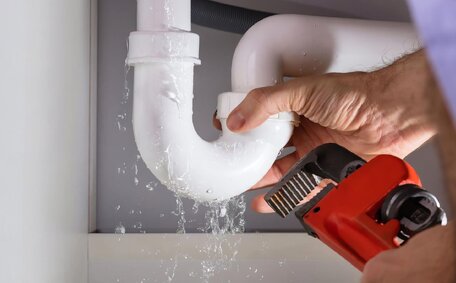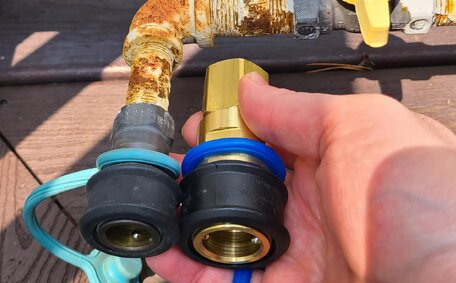Understanding Smart Hot Water Systems
Smart water heating systems harness home automation to give you enhanced efficiency and precise control over your hot water temperatures. Smart water heating systems can utilise various sensors and data to control hot water production, learn your usage patterns and auto-adjust the heating schedule to match demand, thereby helping to reduce your energy consumption.
A key feature of heat pump water systems is remote access, allowing you to control your hot water system entirely from a smartphone app or voice assistant. This affords you effortless control to turn off your hot water temperature, water heater, and monitor usage - all from your smart device.
Many units can also connect to your existing smart home gadgets and your solar PV system to efficiently utilise solar hot water energy during the day. And smart metre and weather data can further enhance how hot water energy is managed to save money on your energy bills.
In a typical configuration, water heater smart devices, occasionally aided by an electric booster, can draw renewable power from grid-connected solar panels during daylight hours. Then your insulated hot water tank captures this solar energy, allowing your hot water tank to gradually utilise it, thus not requiring additional energy overnight.
How Smart Hot Water Systems Work
Smart hot water systems use heat pump technology to transfer thermal energy and heat air around the water tank, compared to traditional electric water heaters. This positions pump water heaters as much more efficient than traditional electric gas water heating systems, by harnessing energy more proficiently.
The heat pump contains a refrigerant that is essential to effectively supply hot water your system requires. As this gas passes through the heating element, it heats up the water, efficiently warming the heater your electric hot water storage relies on. The refrigerant then condenses back into a liquid, cooling down in the process, before being compressed again - ensuring the water heated creates a continuous heating cycle.
Even though they harness latent heat from the air, smart water heaters can operate efficiently in cold weather. And by adjusting the water heating schedule based on usage patterns, you can turn your focus on solar generation, pricing signals etc., ensuring no more energy is spent on wasteful standby operations.
An added benefit is its extremely low maintenance requirements that make your system worry-free. Since there’s no burner, smart heat pump systems take up fewer components that can break down over time compared to conventional electric water heaters.
Integration Options for Connecting Smart Hot Water Systems
There two are several ways to integrate smart hot water systems into an existing smart home setup in the Gladesville area:
Smart Switches: Adding a smart switch gives you wireless control to turn the power and heating on or off from an app or via voice commands. Top options like TP-Link Kasa and Wemo Mini work well with a water heater can to automate its operation.
Smart Thermostats: Connecting to a smart thermostat like Google Nest allows remote temperature adjustment and scheduling aligned with your hot water usage patterns. Nest learning thermostats further aid in cutting energy waste.
Smart Assistants: Linking your Google Home or Amazon Alexa means you can turn the heater on or off, control temperature, get notifications etc using voice commands for total hands-free access.
Home Automation Hubs: Compatible controllers from SmartThings, Home Assistant, and Hubitat can integrate your hot water heater so it automatically responds to presets, sensors, timers, and other smart devices in your home.
These integration options also offer accessibility to a smart hot water system with built-in WiFi/app connectivity. When upgrading an existing conventional storage or electric tank, a smart controller module can be retrofitted to enable remote access and automation.
Connecting to Existing Home Automation and Smart Devices
There are two crucial steps when integrating a smart hot water system with your existing home automation setup, involving pairing it with controllers like Google Home/Assistant, Amazon Alexa, and IFTTT. Here are the key steps:
- Connect to WiFi: Ensure your smart water heater is connected to your home WiFi for app and voice control. Refer to the product manual for specifics on connecting.
- Download companion app: For water heaters from Rheem, Rinnai or Stiebel Eltron, install their app then create an account to access device controls.
- Link to smart platform: Open the app for Google Home or Alexa, select adding new device and choose your smart hot water system’s brand/model to pair them.
- Customise controls: Set schedules, modes, notifications so your water heater responds to presence, usage and integrates with other devices.
You should be able to swiftly resolve common issues like WiFi connection drops by rebooting the device and check your router settings. Check the router, smart hub, and hot water unit signal strength if facing pairing problems.
Connecting to a smart thermostat like Nest allows remote temperature control and automates hot water availability based on learning household activity patterns for greater efficiency.
Installing New Smart Controls for Hot Water Systems
To upgrade your existing hot water unit to a smart system can provide greater efficiency, convenience and potential cost savings. When installing these in the Gladesville area, key steps involve:
Choosing Compatible Smart Controller
You can choose a model specifically designed for your water heater brand that enables app/voice access and automation. Smart modules from EcoNet, Sensi and Flair work with many water tanks or heat pumps.
Professional Installation
It’s suggested that a licenced plumber installs your new sensors, ensuring the product can integrate seamlessly with your domestic hot water supply.
Connecting to Home Automation
Link your new smart hot water controls into platforms like Google Home/Assistant, Alexa or SmartThings for integrated voice commands and automation rules.
Optimising Settings
Take advantage of scheduling capabilities based on usage patterns and pricing signals from your provider. Geo-fencing integration means the system self-adjusts when residents are home.
However, they Note that it can take adding external smart modules to older hot water systems to realise limited efficiency gains, compared to upgrading to an integrated heat pump unit with modern functionality. However, they provide an affordable way to gain app-based insight and automation.
The NSW government currently offers up to a $1,000 rebate on installing certain energy-efficient hot water heat pump models. Check if your preferred system qualifies under the Home Energy Saving Scheme before purchasing.
The Benefits of Connected Hot Water Systems
Connecting your use hot water system in Gladesville to smart home devices and solar power offers multiple advantages:
Energy and Cost Savings
Optimising the heating schedule and harmonising with solar PV can significantly lessen your monthly energy costs. Smart controls help save a substantial amount energy by avoiding unnecessary standby heat during the day. This can lower annual energy bills by $200+.
Convenience and Control
Features like app/voice activation can save you effort, while remote temperature adjustments and leak alerts provide convenience. Automation can still respond to presence, schedules and other devices for hands-off efficiency.
Solar System Integration
Linking your hot water unit with rooftop solar to use excess solar generation contributes significantly to your home’s energy efficiency. This maximises self-consumption without exporting solar power for little feed-in compensation.
Reduced Emissions
Greater renewable solar integration alongside optimised heating lowers a household’s carbon footprint. Heat pump operation generates greenhouse gas emissions less than those produced by conventional electric hot water heating systems.
Optimizing Efficiency and Energy Use
Smart hot water systems offer significant efficiency gains by optimising the schedule for heating water to match actual usage patterns. Built-in analytics closely monitor the household’s hot water demand profile, considering factors like occupancy, timers, temperatures, and flow rate sensors.
By leveraging real-time data, smart controllers can make decisions to heat water only as needed. This avoids wasting energy on heating outside of peak demand periods. Connectivity with smart metres also allows smart scheduling aligned to your favourable electricity tariff.
Integration with rooftop solar panels allows the system to utilise excess solar generation during the day to heat water. This smart utilisation of water energy reduces grid power consumption and maximises self-consumption of renewable energy.
Combined With the extremely high coefficient of performance of integrated heat pump technology, which can supply hot solar water using around 75% less power than conventional electric heaters, smart hot water systems significantly cut energy bills and emissions.
Gaining More Control and Convenience
Smart systems that pump hot water deliver greater control, convenience, and peace of mind every day in managing your water heating needs. Key features that enhance control include:
Remote Access
With a smartphone app, you have the capability to turn water heating off from anywhere. Turn it on or off, change temperatures, set schedules, and monitor usage remotely for full control.
Voice Commands
Just ask your smart speaker to turn water heater settings and get a usage report for hands-free control. Just ask your smart speaker to turn the heater off or get a usage report.
Smart Scheduling
You can program automated schedules that tailor heating times and temperatures to when need arises, based on learned usage patterns. This strategic planning ensures you have water hot when needed and avoids wasting energy.
Smart Notifications
Receive immediate alerts on your phone about leaks or if you’re about to run out hot water, safeguarding your peace of mind. Know immediately if repairs are required or if you’re about to be out hot water.
These smart functionalities bring increased convenience alongside the energy savings from optimised heating. With programmable controls responding to real-time conditions and your schedule, connected hot water systems heat water more efficiently and provide information at your fingertips.
Considerations When Upgrading Hot Water Systems
Upgrading your hot water system in Gladesville involves several key considerations:
Cost
While more expensive upfront, different types hot water systems like heat pump and solar offer long-term savings from lower energy bills. Check potential rebates and calculate how much the payback period would be.
Engage a licenced plumber for installing your new smart heating system to ensure correct configuration with your existing supply and drainage.
Noise Levels
Consider outdoor placement of heat pump systems if concerned about noise indoors. New inverter models are quieter than previous generations.
System Compatibility
When adding smart controls, ensure modules are designed for your hot water brand and storage tank capacity. New wi-fi enabled hot water tanks integrate smart controls.
Discuss needs with your plumber to select the optimal system for your home requirements, budget and capabilities.
Working with Qualified Plumbing Professionals
When upgrading or installing new smart hot water systems, it is crucial to engage qualified, licenced plumbers to ensure correct configuration and integration with your existing setup.
The team at Gladesville Plumbing have over 10 years of experience installing and maintaining hot water systems in the local area. Our fully certified and insured technicians can provide:
- Professional advice on selecting the optimal smart hot water unit suitable for your new home’s requirements and budget;
- Safe, compliant installation of new hot water heat pump systems connected to the mains water supply and power;
- Integration with existing pipework, pump water heater configuration, solar electric and home automation systems;
- Programming and optimisation of smart controls and settings tailored to your usage;
- Ongoing maintenance and repairs to ensure continual efficient operation.
Upgrading to a new smart water heater can save your significant returns on investment. By engaging your local trusted plumbers, Gladesville homeowners can ensure their hot water tank is installed seamlessly, maximising energy savings and convenience benefits.
Contact us today on 1300 349 338 or jobs@gladesvilleplumbingservice.com.au to discuss your needs. As trusted experts in the area, we can ensure your new hot water system turns off during off-peak hours to deliver the highest performance and return on investment.
Following Proper Installation Guidelines
When installing smart hot water systems in Gladesville, ensuring it matches the specific requirements and preferences I wanted, in adherence to Australian standards and best practises for plumbing work, is crucial. This involves taking precautions like:
- Ensuring all pipework connections to mains water supply use approved fittings and materials as per AS/NZS 3500.
- Checking water pressure and configuring expansion control valves to manage pressure spikes.
- You can use a dedicated power circuit for the heat pump unit as per manufacturer specifications.
- Programming heating schedules, geo-fencing and smart features to optimise energy efficiency.
- Providing homeowners with documentation on optimising settings, connectivity troubleshooting, manuals and warranties.
Adhering to all regulations and guidelines ensures your new system operates safely and efficiently. As licenced experts serving Gladesville for over 10 years old, Gladesville Plumbing upholds best practises on all installation and repair jobs. Contact us on 1300 349 338 to discuss upgrading your hot water system today.






